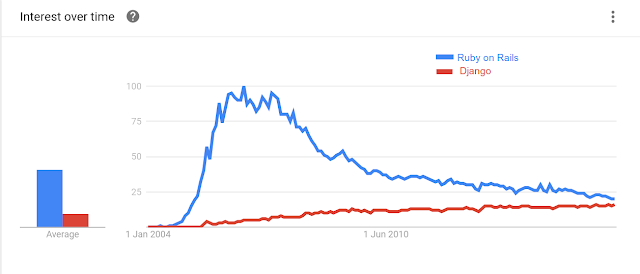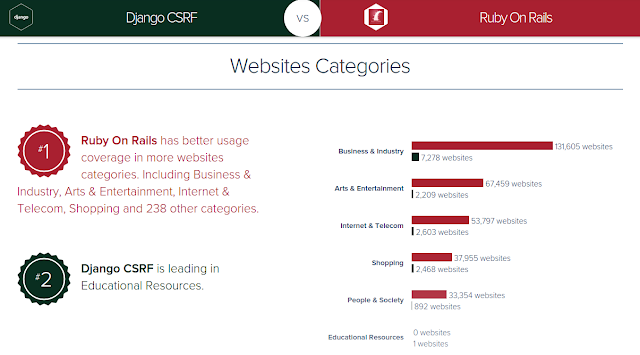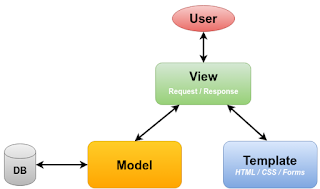Web Framework Wars : Django vs Ruby on Rails
A Brief Introduction
Django and Ruby on Rails are both excellent web frameworks. They are the source of power for many of the powerful websites like Github, Soundcloud, Bitbucket etc. .
Django, based on python , came out in July 2005. It is a powerful framework following Model View Template architecture, powering websites like Bitbucket, Instagram, Pinterest, NASA etc.
Ruby on Rails, based on Ruby, came out in February 2005. It follows Model View Controller architecture. It is being used in many of the top websites like Github, Soundcloud, Hulu, etc.
I will be comparing Django and Ruby on Rails based on following criterias:
- Market Share
- Job Trends
- Technical Aspects
- Available Documentation and Tutorials
- Popular Websites based on these frameworks
#1 Market Share and Trends
Owing to its quick mutation and initial startups based on it e.g. Twitter, Rails attracted a large share of web developers.
Django on the other hand, despite of its power, wasn't quick enough to evolve and thus lagged far behind Rails.
According to Google Trends data:
 |
| Google Trends: Django vs Ruby on Rails |
In terms of numbers of websites, Ruby on Rails towers over Django. According to similartech.com, as of August 2016, Rails powers over 1.8 million websites whereas Django is used in a little over 93k websites.
 |
| Number of Websites: Django vs Ruby on Rails |
Inspecting further, here is a comparison of categories of websites where these frameworks are being used:
 |
| Website Categories: Django vs Ruby on Rails |
Though Django is equally powerful and efficient, and is coming into trends lately, it still has a lot of catching up to do.
#2 Job Demands
Since Ruby on Rails dominates the market share of websites, it also dominates the job share in web development sector.
There is a huge demand of Ruby on Rails developers as compared to Django developers.
According to indeed.com:
 |
| Job Trends: Django vs Ruby on Rails |
Since Django is catching up with Rails and increasing its share in the number of websites. So,the demand for Django developers is very likely to increase.
Verdict: Ruby on rails edges past Django in terms of Job demands too. But the growth of Django in web market share is likely to increase demands for its developers.
#3 Technical Aspects
Architecture and Design Principles
One of the main differences between Django and Ruby on Rails is that Django uses MTV architecture while Rails uses the MVC architecture.
MVC stands for Model View Controller.
Model represents the data in the system/server(usually Database), View defines the presentation of data and Controller is the intelligence and interface between the model and the view.
MTV stands for Model Template View.
Here Model defines the data, Template defines how the data will be presented and View acts as the interface between Model, Template and the User.
Ruby on Rails follows the Convention-over-Configuration principle. CoC means no config files, predefined directory structures and using naming conventions.
It features magical auto imports, auto template naming as well automatic passing of view instances to controllers.
Due to these magical features and shorter codes, the Rails code might be a little tough to debug sometimes.
Django follows Explicit is better than Implicit principle, a core pythonic principle. According to Django's documentation:
Explicit is better than implicit means Django shouldn’t do too much “magic.” Magic shouldn’t happen unless there’s a really good reason for it. Magic is worth using only if it creates a huge convenience unattainable in other ways, and it isn’t implemented in a way that confuses developers who are trying to learn how to use the feature.
Basically a Django project is a collection of many apps. Each app has its own Model, View and Template set, and is responsible for a subfeature of the project.
Django supports more direct way of coding, defining both conventional and unconventional aspects. Django code is more readable and hence is easier to debug.
Native Language
Django has Python as its parent language, which is extremely powerful and scalable. Python has tons of modules which can be used in a Django app. It has a diverse community with close ties to Linux. Python is used by companies like Google, Mozilla, National Geographic,etc.
Ruby on Rails, on the other hand is based on Ruby. Ruby is also a very powerful language with a large number of modules. Ruby uses a magical approach to programming as compared to python which uses a more direct approach. Ruby on Rails is credited as "making Ruby popular".
Ruby is used by Apple, Twitter, Github, etc.
Verdict: Django and Rails are both equally powerful and efficient. Django is powered by Python , used widely in academia and Linux. So it comes with a large variation of modules and libraries.
While Ruby, which powers Rails is more web focussed, making it more suitable for web app developments
While Ruby, which powers Rails is more web focussed, making it more suitable for web app developments
#4 Documentation and Available Tutorials
Both Django and Ruby on Rails has excellent documentations.
Rails Documentation - http://guides.rubyonrails.org
Django Documentation - https://docs.djangoproject.com
Both documentations are suitable for novice web developers with a little background in programming.
Apart from thee official documentations tons of excellent tutorials are available on the Internet.
Few of them are-
Django -
- Django Girls - http://tutorial.djangogirls.org/en/
- Mastering Django - http://masteringdjango.com
- Wired - http://www.wired.com/2010/02/get_started_with_django/
Ruby on Rails -
- Code Academy - https://www.codecademy.com/learn/learn-rails
- Rails Tutorial - https://www.railstutorial.org/book
- Rails for Zombies - http://railsforzombies.org
- Rails Girls - http://guides.railsgirls.com/app
Verdict: Official Documentations of both frameworks are excellent and suitable for novice as well as pros. Ruby edges past Django in terms of unofficial tutorials on the web.
#5 Popular Website on these frameworks
Rails powered Sites:
So what is your choice ?
Web Framework Wars : Django vs Ruby on Rails
 Reviewed by Unknown
on
2:17 PM
Rating:
Reviewed by Unknown
on
2:17 PM
Rating:
 Reviewed by Unknown
on
2:17 PM
Rating:
Reviewed by Unknown
on
2:17 PM
Rating:




First of all congratulations on writing your first blog.It is a good research work done on the topic.It would be great to know your views on object oriented programming.
ReplyDeleteThank you Shardul.
DeleteWill surely write about object oriented programming. Stay tuned
An awesome blog....and an mind bogling comparision between the 2 frameworks and it discloses all the facts from which i was not aware....and it will be a great help for the begginers and geeks....Thank You so much for this...
ReplyDeleteYou don't need such blogs. You are far superior to us;the mortal ones.
Deleteawesome post presented by you..your writing style is fabulous and keep update with your blogs Ruby on Rails Online Training
ReplyDeleteAfter reading this blog i very strong in this topics and this blog really helpful to all.Ruby on Rails Online Training Hyderabad
ReplyDeleteI like your blog, I read this blog please update more content on hacking, further check it once at python online training
ReplyDeleteI am extremely greatfull to you as you shared this.I am recently developing associate app spotify premium apk zippy that is you would possibly have an interest to appear thereon
ReplyDeleteAn awesome blog for the freshers. Thanks for posting this information.
ReplyDeleteDjango Online Courses
Django Training in Hyderabad
Python Django Online Training
Python Django Training in Hyderabad
Nice and good article.Great site and a great topic as well I really get amazed to read this.I gained many unknown information, the way you have clearly explained is really fantastic.
ReplyDeleteFull Stack Training in Chennai | Certification | Online Training Course
Full Stack Training in Bangalore | Certification | Online Training Course
Full Stack Training in Hyderabad | Certification | Online Training Course
Full Stack Developer Training in Chennai | Mean Stack Developer Training in Chennai
Full Stack Training
Full Stack Online Training
Your blog is in a convincing manner, thanks for sharing such an information with lots of your effort and time
ReplyDeleteruby on rails training
ruby on rails training
Post it in the future in articleadvanced python
ReplyDeleteMmorpg oyunları
ReplyDeleteINSTAGRAM TAKİPCİ SATİN AL
tiktok jeton hilesi
tiktok jeton hilesi
antalya saç ekimi
INSTAGRAM TAKİPÇİ SATİN AL
İNSTAGRAM TAKİPÇİ SATIN AL
metin pvp
Instagram takipçi
Smm Panel
ReplyDeletesmm panel
iş ilanları blog
İnstagram Takipçi Satın Al
hirdavatciburada.com
beyazesyateknikservisi.com.tr
Servis
JETON HİLESİ İNDİR
tuzla samsung klima servisi
ReplyDeletetuzla toshiba klima servisi
tuzla beko klima servisi
çekmeköy lg klima servisi
beykoz beko klima servisi
üsküdar beko klima servisi
pendik lg klima servisi
pendik alarko carrier klima servisi
pendik daikin klima servisi